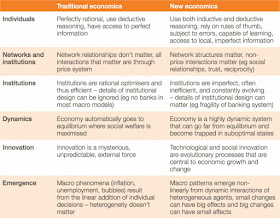Eric Beinhocker tries to go beyond the left-right distinction and economic orthodoxy to describe what he calls "economics for the real world". He describes the 'new economics',
Rather new economics is best characterised as a research programme that encompasses a broad range of theories, empirical work, and methods. It is also highly interdisciplinary, involving not only economists, but psychologists, anthropologists, sociologists, historians, physicists, biologists, mathematicians, computer scientists, and others across the social and physical sciences. It should also be emphasised that new economics is not necessarily new. Rather it builds on well-established heterodox traditions in economics such as behavioural economics, institutional economics, evolutionary economics, and studies of economic history, as well as newer streams such as complex systems studies, network theory, and experimental economics... The common thread running through this broad research programme is a strong desire to make economic theory better reflect the empirical reality of the economy. New economics seeks explanations of how the economy works that have empirical validity. Thus behavioural economists run painstakingly crafted experiments to explain actual human economic behaviour. Institutional economists conduct detailed field investigations into the functions and dysfunctions of real institutions. Complexity theorists seek to understand the dynamic behaviour of the economy with computer models validated against data.
He points to the use of the likes of agent-based models to analyze various markets. On policy making, he advocates eschewing the traditional mechanistic approaches (incentives, interventions to correct market failures, costs-benefits analysis etc) and embrace an approach that accommodates complexity, unpredictability, and reflexivity.
He outlines three principles of this approach. One, instead of going in with one design, experiment with multiple approaches and iterate and refine the ones that work best. Second, policies and institutions should be as adaptable as possible. Third, instead of being policy engineers, policy makers need to see themselves as stewards who "create the conditions in in which interacting agents in the system will adapt towards socially desirable outcomes". This would involve an evolutionary approach to execution.
This is an addition to a growing body of literature that advocates an experimental and iterative approach to program design and implementation.

No comments:
Post a Comment